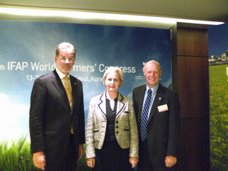Ecooperation, the Dutch foundation that steered the agreements for sustainable development that the government had signed with Costa Rica, Bhutan and Benin, suggested Agriterra in the mid 1980s to work with the farmers of Benin. The first action was an inventory, consulting a dozen Dutch NGOs and institutes with a track record in that country with the objective to know the rural people’s organizations that might exist. Apart from SNV, that informed that at grass-roots level association and women’s groups were active, the consulted persons indicated that farmers were unorganized. This diagnosis became an example of NGO blindness for genuine organization of the people and their biased attention for local NGOs, so recurrent in development cooperation at that time. This was so, because a short visit and diagnosis conducted by Agriterra revealed that there existed a farmers’ federation with national aspirations (FUPRO) and a Chambre d’Agriculture[1]. The same study illustrated that this farmers organization remained weak in the poor south of the country.
With Agriterra’s support FUPRO started to work in these regions. This was important, because the initiators of FUPRO are cotton farmers. Being an export product and also produced on larger farms, FUPRO was branded a rich farmers federation. In these regions FUPRO started to improve the chains of cassava, palm oil and pineapple. AFDI, the French agri-agency, illustrated the results in the latter case during the Farmers Fighting Poverty seminar in Arnhem, 2006[2]. The NLTO deputy president Willy Schutte and policy officer Douwe Hollenga started the cooperation of this Northern LTO branch with FUPRO and geared their attention to the cotton sector. The possibilities of organic cotton were commonly explored. Directors, staff and members of FUPRO visited the Netherlands in numerous occasions for exchanges with LTO and French farmers or to present vegetables on the Rotterdam AGF fair. Staff of NLTO commented on plans of FUPRO to start a demonstration farm for sustainable agricultural production. In 2003 NLTO directors were involved in the reorganisation discussions in FUPRO that ultimately gave the cotton growers branch status and representation as branch in the FUPRO board.
In 2002 Klaas Jan Osinga visited FUPRO for the first time participating in a conference on organic cotton. This niche product was seen as a way out of the crisis in cotton that was due to low prices. These were attributed to the subsidized exports from the United States, the second biggest exporter in the world. Indebtness of cotton producers was the result. Yet, the study did not give evidence that this could become a solution for the cotton sector of Benin. The monopolist position of the state ginnery seemed to be more urgent to change. During the IFAP World farmers Conference in 2003 in Washington, Osinga introduced FUPRO directors to the National Cotton Council of the United States. In that occasion the FUPRO directors got two eye-openers: one to regain the market, careful designed marketing is needed to create an unique selling point for West-African cotton; and, not so much United States’ subsidized cotton but the developments in major producing countries as China and India will dictate the opportunities for West-African cotton in the world market.
The case of FUPRO shows the benefits of the contact that can be made trough the international cooperation, especially when not confined to one country but –like in this case- explicitly linking it to Dutch and French efforts and placing them in the IFAP framework.
[1] Agriterra, 1998; Agriterra, CIEPAC, AJF, CBDD, 1999
[2] http://www.farmersfightingpoverty.org/cases1-1.html
Subscribe to:
Post Comments (Atom)
Check these interesting contributions from other sites & blogs
- On Farmers Organization in Egypt
- Law on farmers Organizations in China
- Interview with FAO officials on Farmers Organizations
- Farmers use mobile phones
- comment of Kees Blokland on anti-CAP campaigning
- Poverty & growth blog of the World Bank
- Gapminder statistics visualized
- Guide for implementing ICT projects - iCommons december 2006
- Africa: tools of liberalisation - Patricia Daniel, University of Wolverhampton, England
- Business and the rural poor - Harvard Business School
- Profiling Asian Farmers Association members - Jan 4th, 2007
- Fiji Times report on AgriCord grants to Sugar Farmers - January 04, 2007
- Increasing Impact - marrying micro-credit and micro-insurance - The disconfort Zone, january 4th, 2007
- Programs that Fight Poverty - Institute for Advanced Technologies in Global Resilience - November 17, 2006
- University of Chicago Press Journals reports on GMOs - January 25, 2007
- Biotech crops to help reduce poverty - Kauser A Malik, in the Daily Times (Pakistan) January 25, 2007
- Why does China grow so fast - Michael Spence The Wall Street Journal 23 january 2007






No comments:
Post a Comment